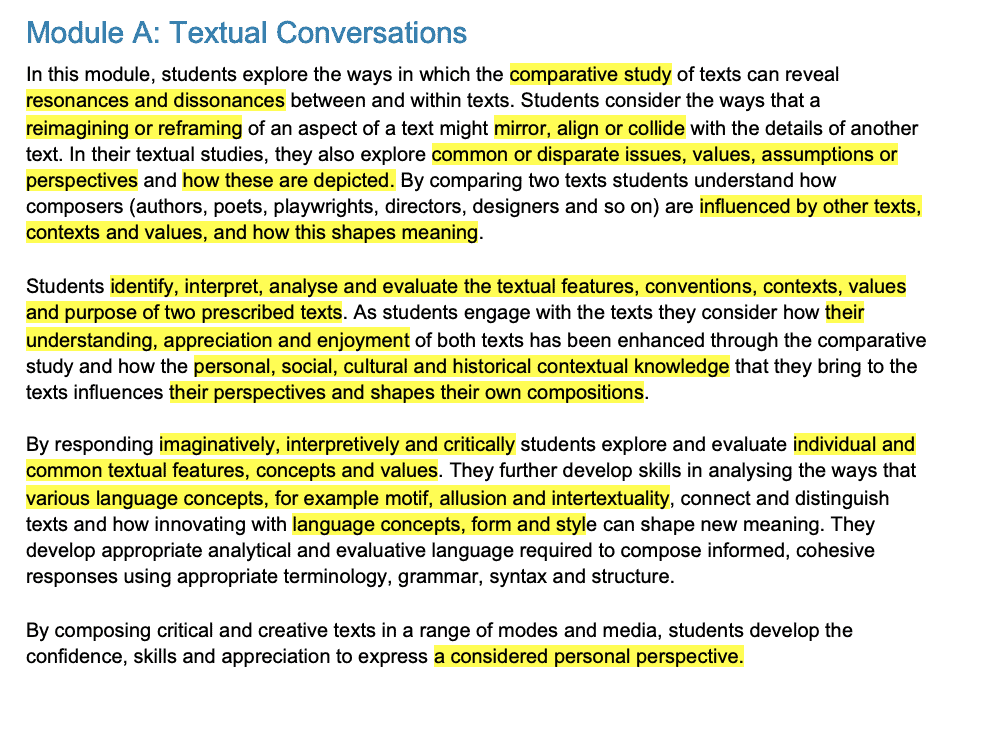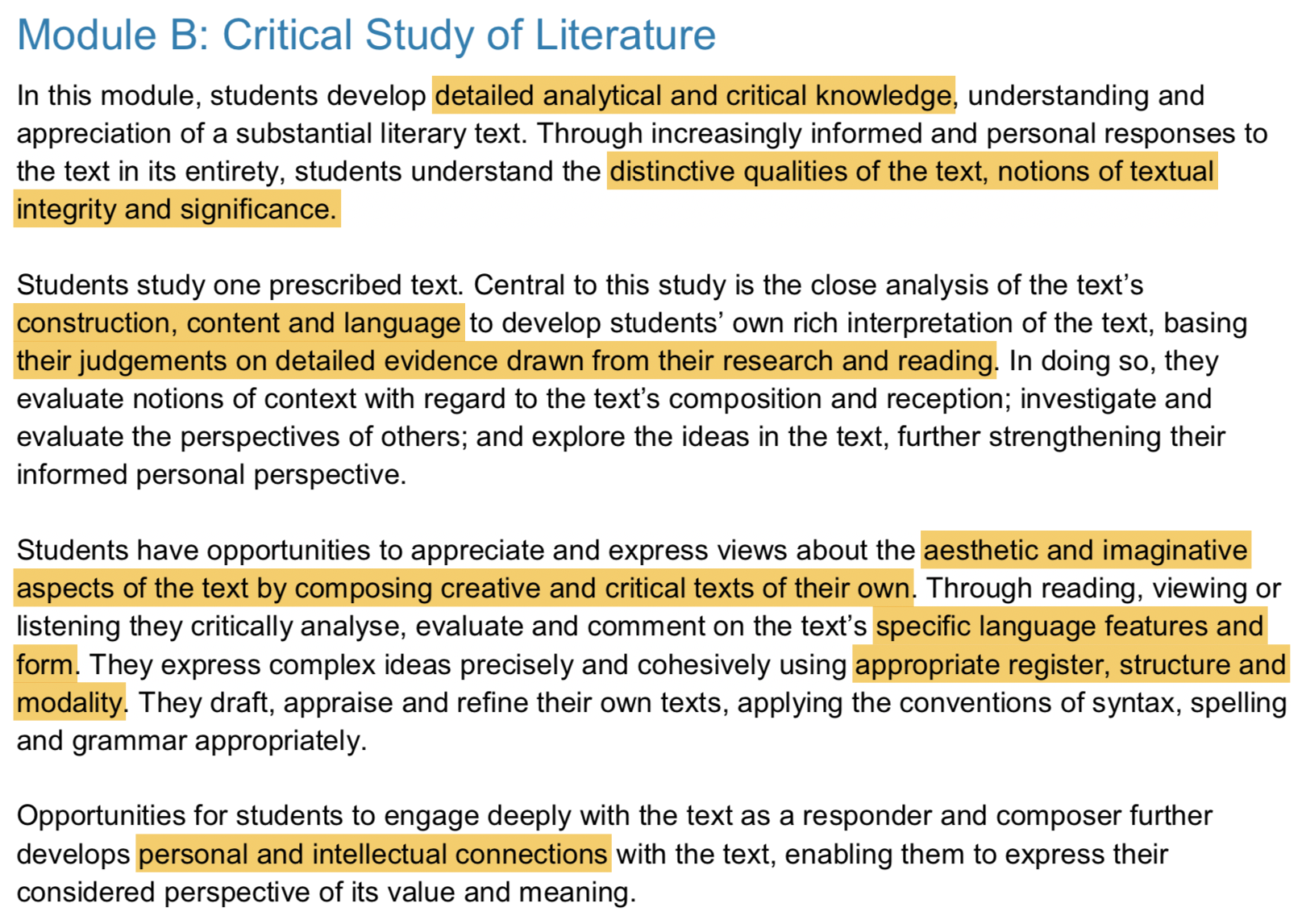
Have you got questions about HSC Advanced English?
Don’t worry, we all did! But don’t sweat it, we have trawled through forums, asked people on Facebook and consulted the students we teach to compile these HSC Advanced English Frequently Asked Questions!
If you’re looking for general FAQs about HSC English in general, head over here!
1. Does doing Advanced mean I’ll get a good ATAR?
Truthfully no. While strong marks in Advanced English will result in a better ATAR score than strong marks in Standard English, it’s the ‘strong marks’ that’s important, not the unit.
Just doing Advanced English isn’t going to ensure that you’ll do well or get good marks – that’s up to you!
In fact, it’s all to do with percentile, quartiles and scaling. Your cohort and your performance are more important to your success than the level you’re studying!
It also means that if you feel like Advanced English isn’t the best fit for you then you don’t necessarily have to stay there.
If you know you could be at the top of a Standard class but are struggling to even pass in your Advanced class consider changing!
Ultimately strong marks in Standard English will score better than weak marks in Advanced.
2. Will reading sample essays actually help me?
If they’re good sample essays, yes! By reading over work that has marked well it’s a lot easier to pick up on the things that make it a strong essay, even though you (in theory) know what markers are looking for.
When you can see it written out in an essay it’s much easier to identify points of strength and then emulate them in your own writing.
For example, if you struggle with essay structure, reading sample essays will give you great examples on how to structure your responses effectively. Likewise if your language choices aren’t up to scratch, seeing what language other people choose in their essays can really help.
Sometimes if your language is getting stale, seeing other people’s writing can reinvigorate your writing style. That’s why when authors get writer’s block, most of them stop writing and start reading!
Just keep in mind that not all sample essays are good ones, so make sure you’re getting them from past papers, marking feedback, etc. If you know any friends or family who did well you can even ask to read their old essays!
3. How long should my essay be?
It depends. Most essays sit within the 1,000 – 1,200 range, but some have been known to go ~100 words over or under. You definitely want to be aiming to hit the 1,000 word mark, as this is seen as a benchmark when it comes to ‘writing enough’, but it is more important to have good quality content rather than bad quality ramble.
You have to think of your essays in their value rather than a word count. If your essay is saying everything it needs to say and is saying it in an eloquent, sophisticated way, then you don’t need to fuss too much about word counts unless they’re massively over.
Generally 800 words isn’t enough to get everything down, so if you’re under you know you haven’t said everything in detail or in a sophisticated way.
4. How long should my creative writing piece be?
This is harder to answer, because a creative piece doesn’t really have a set structure or format, so you can’t say when is ‘enough’.
Generally you want to look at time limits; if you have 40 mins for analytical and you write 1,000 words, you should be doing the same for creative because you have 40 mins for that as well.
That said, it’s much less worry if you go under in creative writing, so long as your writing is still strong, makes a point and has some level of creative integrity.
I know for a fact that my HSC creative writing was shorter than my essay, but that didn’t worry me because I knew it suited the stimulus and made a clear point about the topic. You should aim to do the same in your writing. That said, anything under the 800 mark could be getting a bit too short.
Again, it is more important to producing good work rather than stale ideas. If you need help, you can check out our ultimate Module C: The Craft of Writing Creative Writing Guide here!
5. What’s Module A about?
HSC Advanced English Module A is called Textual Conversations!
This module is a comparative study, meaning you study two texts. These texts have a direct intertextual relationship and will examine what they have in common and also how they differ.
Often, each pairing is made of an earlier text and a more recent text that is either a retelling of, commentary on, or engagement with the older text.
You can check out our in-depth guide to HSC Advanced English Module A here to read more about what it’s all about!
Let’s take a look at the syllabus below!

Essentially, in the study of your two texts, you will be analysing how values, issues and perspectives are shared between the works or/and how they differ.
You’ll also take into account the context of each text, include any personal, social, cultural and historical knowledge.
If you’re looking for some practice questions for Module A, check out our list of 20 practice essay questions here!
6. What’s Module B about?
HSC Advanced English Module B is called Critical Study Of Literature, and as you may be able to guess by the module title, Module B is all about an in-depth study of a single text!
The aim of this module is for you to be able to develop a personal and intellectual connections to the text.
You will be reading, analysing and responding critically and creatively to your text, with the hope that you develop an appreciation and personal relationship to the text and its themes and ideas.
For an in-depth guide to Module B: Critical Study of Literature, check out our guide that breaks it all down here!
Let’s take a look at the syllabus below!

As the syllabus suggests, through a detailed and critical analysis of your text, you’ll be focussing on what makes your text distinct, significant and of great textual integrity.
If you’re in need of some practice essay questions for Module B, make sure you check out our 20 practice questions here!
7. What’s Module C about?
HSC Advanced English Module C is called ‘The Craft of Writing’, which is a module dedicated to helping students effectively write imaginative, persuasive and discursive pieces.
It involves writing pieces inspired by texts that have been taught in class and also possibly reflecting upon these creative decisions with a reflective statement.
Let’s take a look at the syllabus below!

Essentially, you’ll be developing your writing skills in this module, using language to convey ideas and emotions.
You can check out our in-depth guide to Module C here!
If you’re looking for some practice questions for Module C, you can also check out this article here!
8. How many quotes should I have in my essay?
I always recommend the minimum three-quote formula.
It works like this; for each paragraph you have two quotes that you analyse for techniques and one you use as backup.
Now you can mix this up by adding extra backup or technique quotes, but the point is two make sure that you have multiple quotes to analyse as well as one just to throw in there to prove you know what you’re talking about.
Example
Shelly uses a frame narrative to juxtapose the characterisation of Victor Frankenstein before and after becoming the “author of unalterable evils”; he first appears as “a man on the brink of destruction”, however this hyperbole is quickly contrasted with his account of the vigour with which he practiced science in his youth. In describing Frankenstein as having been consumed by “one thought, one concept, one purpose”, Shelley highlights a lack of moderation or balance in his scientific ventures, and details the destructive effect of lacking these values.
In this section the first quote is just used to establish knowledge of the text, while the second two are deconstructed for analysis.
That way markers will see that you know how to analyse quotes, but you can also use them outside of that just to support your understanding of the text.
Looking for some extra help with HSC Advanced English?
We have an incredible team of HSC Advanced English tutors and mentors who are new HSC syllabus experts!
We can help you master your HSC English text and ace your upcoming HSC English assessments with personalised lessons conducted one-on-one in your home or at our state of the art campus in Hornsby!
We’ve supported over 5,000 students over the last 10 years, and on average our students score mark improvements of over 19%!
To find out more and get started with an inspirational HSC English tutor and mentor, get in touch today or give us a ring on 1300 267 888!
Maddison Leach completed her HSC in 2014, achieving an ATAR of 98.00 and Band 6 in all her subjects. Having tutored privately for two years before joining Art of Smart, she enjoys helping students through the academic and other aspects of school life, even though it sometimes makes her feel old. Maddison has had a passion for writing since her early teens, having had several short stories published before joining the world of blogging. She’s currently studying a Bachelor of Design at the University of Technology Sydney and spends most of her time trying not to get caught sketching people on trains.


